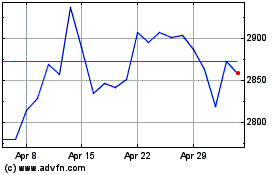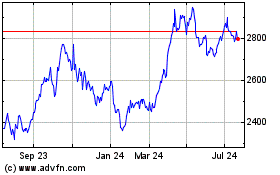Shell Tries to Woo Investors With Dividend Raise, Promise of Future Payouts -- Update
October 29 2020 - 9:52AM
Dow Jones News
By Sarah McFarlane
LONDON -- Royal Dutch Shell PLC said it would start raising its
dividend again -- after slashing it just months earlier -- and
planned to eventually increase shareholder payouts further,
projecting an upbeat assessment of its ability to weather the
pandemic-induced oil-demand shock.
The pandemic forced Shell to reduce its dividend by two-thirds
in April -- its first cut since World War II -- and helped trigger
a restructuring of the company, part of a broader plan at Shell to
accelerate investments in low-carbon energy.
The company is now increasing its dividend 4% to 16.65 cents a
share and said that once it has reduced its debt to $65 billion, it
would aim to give 20% to 30% of cash flow from operations back to
shareholders. Shell's debt was $73.5 billion at the end of
September.
"The strength of our performance gives us the confidence to lay
out our strategic direction, resume dividend growth and to provide
clarity on the cash allocation framework, with clear parameters to
increase shareholder distributions," said Chief Executive Ben van
Beurden.
Shell now plans to spend 25% of its annual $19 billion-to-$22
billion investment budget on "the future of energy businesses"
which include marketing, power, hydrogen and biofuels, up from an
average of 11% over the past three years.
Shell intends to focus on investing in oil projects that have
the highest returns, while growing its liquefied natural gas
business. It will shrink its refining portfolio to six energy and
chemical parks, from the current 14 sites.
The accelerated investment plans in low-carbon energy follow a
similar move by BP PLC, which said in September it would cut its
oil and gas production by 40% over the next decade and increase its
expenditure on renewables and other low-carbon energy sources.
Mr. van Beurden declined to say whether Shell's oil production
would shrink, saying the company was focused on value, not volume.
The company plans to cut up to 9,000 jobs, about 11% of its
workforce, following similar cost-saving moves at Chevron Corp. and
BP.
Shell's third-quarter performance was hurt by lower refining
margins and a fall in refining activity, along with lower margins
in its LNG business, as lower crude prices started to filter
through to LNG contracts linked to oil prices.
Refining can act as a hedge for major oil companies during times
of lower energy prices, but recently even these areas haven't been
as profitable. Refining margins have in the past risen when oil
prices fell, but fuel demand is also weak, with people driving and
flying less because of Covid-19.
Shell said that its gas-trading results were lower than during
the comparable period a year ago. BP, which posted earnings earlier
this week, also said trading suffered.
Shell further reduced the value of its giant floating gas
project Prelude by around $1 billion. In July, the company cut the
value of its assets by $16.8 billion and didn't give a breakdown of
projects affected, but about $4 billion was attributed to Prelude,
said a person familiar with the matter.
During the second quarter, oil prices plummeted as countries
locked down to slow the spread of the virus. More recently, lower
volatility has reduced trading opportunities as Brent oil prices
have stabilized at around $40 a barrel.
Shell reported a third-quarter profit on a net
current-cost-of-supplies basis -- a figure similar to the net
income that U.S. oil companies report -- of $177 million Thursday.
That compared with a profit of $6.08 billion in the same period
last year.
The company said that its marketing division reported strong
margins, which helped offset lower sales volumes.
Shell's shares traded up 1.5% Thursday.
"We have challenged the lack of a clear financial framework
since the dividend cut in April, and the plan set out by the Shell
management team clearly addresses this," said Lydia Rainforth, an
analyst at Barclays.
Shell said it would give more information in February on how its
restructuring feeds into its strategy, including details on its
future portfolio, and plans for low-carbon energy investments.
Its gearing level -- net debt as a percentage of total capital
-- was 31.4% for the three months to the end of September, down
from 32.7% in the previous quarter and above the company's target
of 25%.
The company said it expected divestment proceeds of $4 billion a
year on average, helping reduce net debt.
U.S. oil giants Chevron and Exxon Mobil Corp. are due to report
results Friday. Exxon has already indicated a potential loss from
its oil-and-gas production business.
Write to Sarah McFarlane at sarah.mcfarlane@wsj.com
(END) Dow Jones Newswires
October 29, 2020 09:37 ET (13:37 GMT)
Copyright (c) 2020 Dow Jones & Company, Inc.
Shell (LSE:SHEL)
Historical Stock Chart
From Mar 2024 to Apr 2024

Shell (LSE:SHEL)
Historical Stock Chart
From Apr 2023 to Apr 2024
